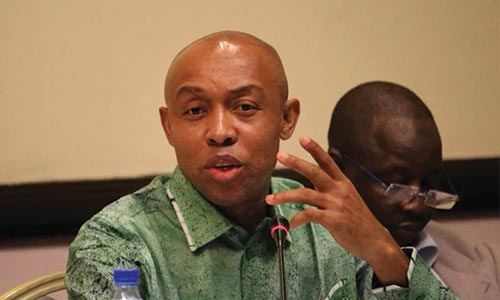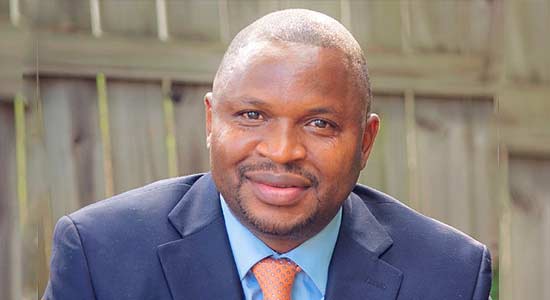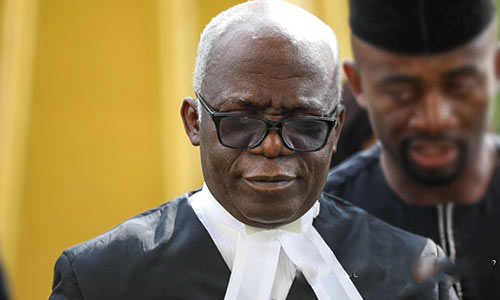Judicial Mercenarism

By Chidi Anselm Odinkalu
In July 1977, the Organization of African Unity adopted a Convention for the Elimination of Mercenarism in Africa. It offered a definition of a mercenary to include someone who “is motivated to take part in hostilities essentially by the desire for private gain and in fact is promised by or on behalf of a party to the conflict material compensation.” The drafters of the Convention for the Elimination of Mercenarism in Africa probably did not foresee that it would encompass the conduct of judges.
Yet, at the beginning of this month, the immediate past president of the Nigerian Bar Association (NBA), Olumide Akpata, took to the floor of the International Bar Association (IBA) conference in Paris, the capital of France, to invite the association to take an active interest in a new species of judicial subornation in Nigeria which can best be described as judicial mercenarism.
Carl von Clausewitz, the Prussian General, is credited with the insight that war is the continuation of policy by other means. The converse can also be true: that policy and politics could also be war by other means. Private military contractors, also known as mercenaries, are paid to fight in other people’s wars.
Judicial officers are ordinarily not politicians. So, when they choose to immerse themselves in the theatre of power politics, it is impossible to avoid the conclusion that elements of mercenarism are involved.
This mercenarism can manifest itself in the form of judicial fornication, soliciting, or contumeliousness. Let’s begin with judicial fornication. In his memoir, The Accidental Public Servant, former Minister of the Federal Capital Territory (FCT) and recent governor of Kaduna State, Nasir El-Rufai, recounts that the Chief Judge of the FCT when he became Minister, Justice Lawal Hassan Gummi, had preceded him to the Barewa College in Zaria. As Minister, he desired “to ensure the judiciary was fully on board with our reform directions”. Although advised by his staff to invite the Chief Judge to a “briefing” with the Minister, El-Rufai exultantly recalls that he overruled them because “our old boys’ protocol trumped all others they may have in the FCT.” So, in obedience to the supreme law of the Barewa Old Boys Association (BOBA), El-Rufai “visited Justice Gummi, met with his team of senior judges and…. prayed for their support.”
The result, El-Rufai further exults, was that “the FCT judiciary supported us strongly throughout my tenure”, and the official pay-off was a Ministerial decision “to budget an annual grant to support our judiciary to procure court recording and automation equipment.”
The reader may note two things. One is that in the narration of the Minister, the FCT judiciary became transformed from an institution established to hold a fair balance between different interests in society to one dedicated to servicing the Minister and his FCT administration. The second is that the judiciary thus became – in his telling – part and parcel of the government of the day to be instrumentalized as the government dared, not an independent institution to hold the government to account. This was judicial fornication at Ministerial beck-and-call.
After the publication of this book, some non-governmental organisations under the aegis of the Civil Society Network against Corruption (CSNAC), petitioned against Lawal Gummi to the then Chief Justice of Nigeria (CJN), Aloma Mukhtar, who also chaired the National Judicial Council (NJC). In response, the CJN issued a disciplinary query to the Chief Judge of the FCT “seeking explanation over an annual grant made to the FCT judiciary by the FCT administration during Nasir El Rufai’s administration.” Reluctant to be dragged through the process, Lawal Gummi took early retirement and promptly got translated to the stool of the Gummi Emirate in Zamfara State.
One decade later, the current successor to the seat of the Chief Judge of the FCT, Husseini Baba-Yusuf, preferred to take matters a notch higher by showcasing his skills in judicial soliciting. Rather than have the Minister pay him a visit, the Chief Judge went to promenade for the Minister of the FCT instead, and took the opportunity to show off his plumes. Assuming the role of a judicial Vuvuzela, he began by hailing the Minister as having “exceeded the level that people had thought you would perform”, before reminding him that “as the judiciary, we are part of the government and we expect that we should be able to do things that will make government work.”
In claiming that the judiciary is “part of the government” the Chief Judge was fully aware that he was inviting the Minister into an intimate transaction.
So, the Chief Judge let it be known that he had issued directions to the judges under him that “all cases involving the FCT will only be assigned by the Chief Judge….” A suitably tingled Minister of the FCT happily nodded “thank you”, while the judges and sundry hangers-on accompanying the Chief Judge clapped uproariously in full expectation of full-on consummation.
While the conduct and verbiage of the current Chief Judge were even more egregious than those of his durable predecessor from one decade ago, few expect him to suffer anything like the consequences that followed the revelations in The Accidental Public Servant. The reason is because these days judicial mercenarism occurs in the full glare of the records.
Judicial decision making is ordinarily deliberative and its language, even in the pen or keyboard of the colorful, is usually clothed with dignity. These days, however, some judges in Nigeria are not shy about announcing which political side has penetrated their judicial orifices. They are not merely contumelious but choose to advertise it.
When it decided to nullify the election of Governor Ademola Adeleke of Osun State earlier in the year, for instance, Justice T.A. Kume, who sat as part of the Governorship Election Petition Tribunal relied on the high authority of Kizz Daniel’s popular single, Buga, to hold that Adeleke “cannot ‘go lo lo lo lo’ and ‘buga won’ as the duly elected governor of Osun State.
In the Kano State governorship election petition decided last September, Benson Anya, a judge on the tribunal went one further. Relying on matters that were never in evidence or in dispute before the Tribunal, he described one side to the case as “bandits in politics” and decided “to condemn the gang of Red Cap wearers (a reference to the supporters of the second respondent in the case) who, like a violent and terrorist cult, chased us out of Kano and put us in the fear of our lives. We believe that only Allah is the giver of power. Those who believe in Allah must bow to his (sic) will and submit to the authority of Governmental (sic) power.”
For the avoidance of doubt, the author of this insightful theological distraction is a Christian from Abia State in south-east Nigeria and no question about Allah or His supremacy was even remotely in contention in the case. It did not require any imagination to understand that the god under reference by Benson Anya existed entirely in his head, probably from vanities he harboured about the finality of the judicial vote in determining election outcomes.
It is no surprise that this kind of thing only happens in political and election disputes where politicians chase judges with money and induce open trades in the outcome of judicial proceedings. This is why Judicial mercenarism is often accompanied by unconcealed hubris. Just this past week, Yargata Nimpar, a Justice of Appeal, informed the appellants in the judicial contest over the governorship of Lagos State that they “came empty-handed and left empty-handed. They merely enjoyed their day in court.”
The courts no longer even pretend to tether their pronouncements to any sense of principle, precedent or proportion. To use an expression originated by our neighbours in Cameroon, judicial mercenarism now manifests itself in an open jurisprudence of “buy am; sell am.”
A lawyer and a teacher, Odinkalu can be reached at [email protected]



